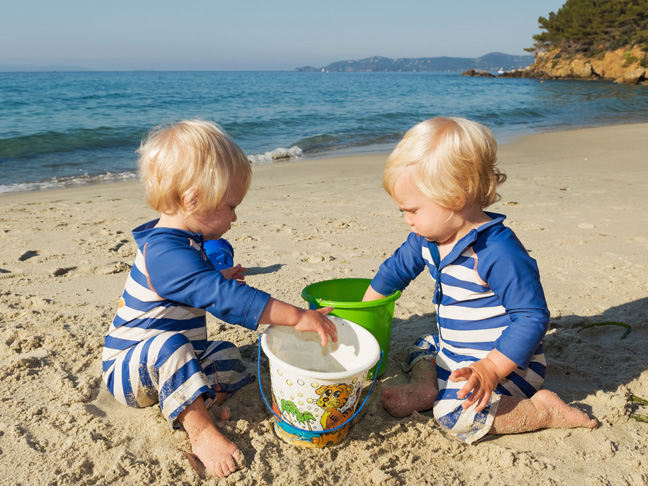So, early on in my pregnancy, I decided that I wasn’t going to play up my boys’ “twinness” or make that a defining characteristic in their lives. I wanted to be sure that I allowed each boy to be himself, and embrace what made him unique. I resolved to never dress them alike, never refer to them as “the twins,” and to give them time apart from each other when I could.
Then, my babies were born, almost the exact same size, with those nondescript faces that so many newborns have (you know it’s true). Except to me, they didn’t look or seem identical. One boy had a crooked little mouth and a playful expression. The other looked me directly in the eye, like he was reading my mind, and made these odd humming noises. Even as newborns, they were just a little different, in a way that I couldn’t really articulate. I never got them confused or wondered which boy I was holding. Their expressions alone, even as babies, gave them away.
Every step of the way, they’ve had similar dispositions, but different personalities. They each have their own energy, their own distinct voice, their own preferences and triggers. They’re not polar opposites at all, not yin and yang, and yet they’re perfect complements to each other. We haven’t encouraged them to seek out separate interests and identities, but they do anyway. It’s just who they are. It’s innate. They have the same DNA, the same blueprint, but they are different souls.
Still, parents can’t help but compare their kids to each other, whether you have twins, same-sex siblings, or boys and girls, born several years apart. We have different experiences with each child, so we analyze what it all means. We’re sort of in awe that kids from the same family, our family, could be alike in some ways, totally dissimilar in others. Often, we praise one child for a particular strength, and then immediately praise the other for some unique gift of his own. We don’t want to play favorites. We want to be fair. We want our kids to feel equal.
When you have children the exact same age, the same gender, and identical on top of it, it’s almost impossible not to compare. People want to know how they’re different, and you want to be able to identify those unique characteristics for them. Sometimes, the easiest thing to do is just use a more/less comparison to make those distinctions. I’m often so focused on making sure others see them as separate that I fall back on, “Well, he’s more like this and he’s more like that.” It’s a mistake though.
First of all, kids change so quickly that you really can’t define them as one thing or another. When they were babies, my smaller boy was in physical therapy, and I worried that he would always feel weaker than his brother. But, the smaller one learned to walk just one week after his twin, and now he climbs like a monkey and struts across a balance beam with the confidence of a gymnast. Now that my twins are in the throes of toddlerhood, their moods change almost daily. They take turns being chatty. They take turns being affectionate. They take turns being emotional and temperamental and needy. So no, I can’t say that one kid is more imaginative than the other, or that one is more loving than the other, or that one is more sensitive than the other.
I once read that saying things like, “This one is more friendly and this one is more shy” can often create a self-fulfilling prophesy in your kids. Obviously, you’re not intentionally trying to box them in, but they absorb it anyway. On a subconscious level, they adopt the behavior of the kind of person they believe they must be, like the friendly one or the shy one. Even though I know better, I’m totally guilty of saying things like, “Oh yeah, he takes a little longer to warm up,” or “Oh yeah, he’s the brave one.” I mean, one of my kids will introduce his whole family to a stranger while the other closes his eyes tight to avoid interaction. And that same “shy” kid will go right up to high-five the guy in the Buzz Lightyear costume, while the other one is shaking with fear in my arms. So, which one is friendlier? Is one really more “brave”?
I think that, with twins, you have to be especially careful because they go through school together, surrounded by the same kids and teachers. If you inadvertently trap them into a type, they might not feel allowed to explore other facets of their personality, ones they feel “belong” to their twin. A girl lets her twin do all the talking because she’s the “outgoing” one. A boy doesn’t try out for soccer because it’s his twin brother who’s better at sports. It’s like there’s no room for two social butterflies or two soccer stars–one may always feel that he or she has to cede to the twin who is apparently more friendly/athletic/funny/focused. My brother, just a year younger, didn’t start exploring his creative side until I was at college, maybe because there was so much discussion about how I was the writer and he was so good at math. Well, now we both make a living as writers (and, for the record, I kicked ass at math).
So, I try my best to use different language to describe each of my boys, without any more/less comparisons. I talk about what interests each of them, rather than what might be talents or strengths. And I think about who each boy is right now, at this moment in time, and try not to get fixed on any preconceived idea about who each of them will be.
Look, none of us are that simple. We’re not either or, more or less, a or b. We’re all of the above. We are layered and complicated and walking contradictions. We can be sweet and also mean, funny and also serious, driven and also lazy. I think all parents know that their children aren’t just one thing or another. For parents of twins though, the challenge is to identify those ways each child is unique and different, without sticking them with labels they can’t shake.
Photo: Getty








